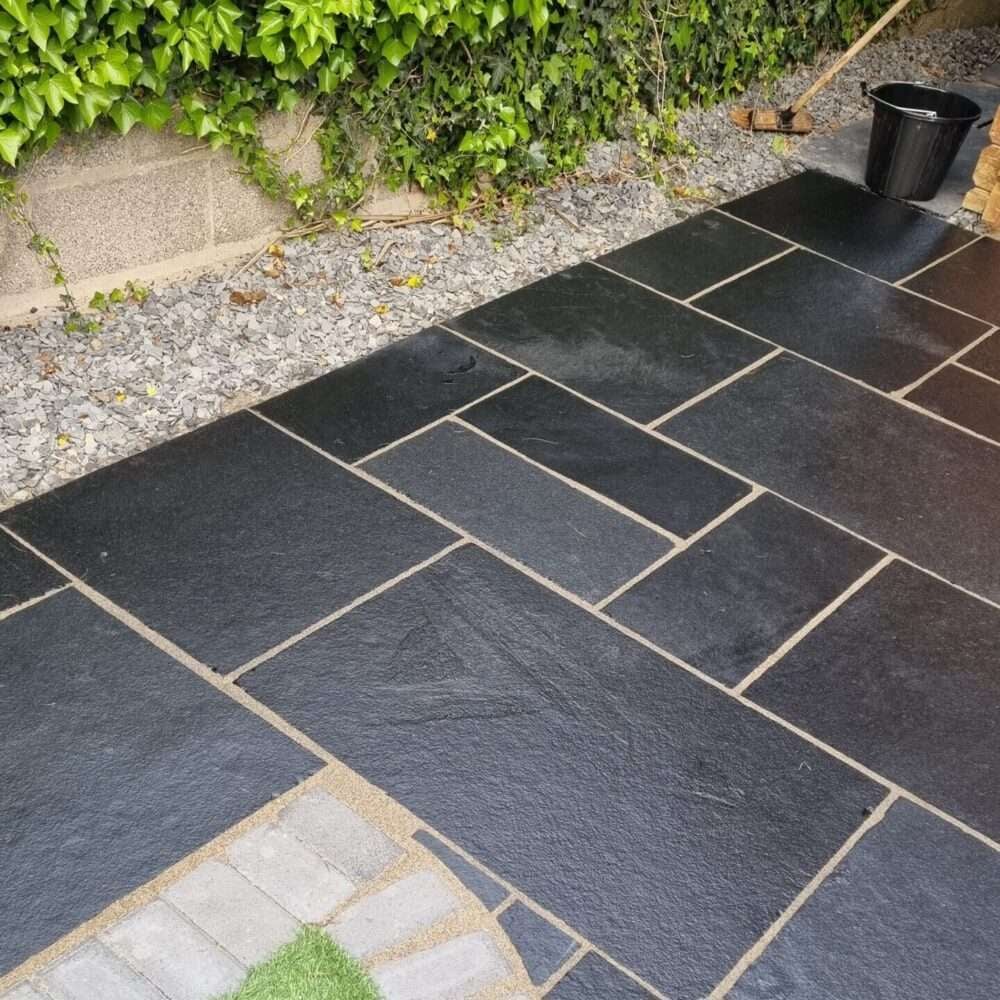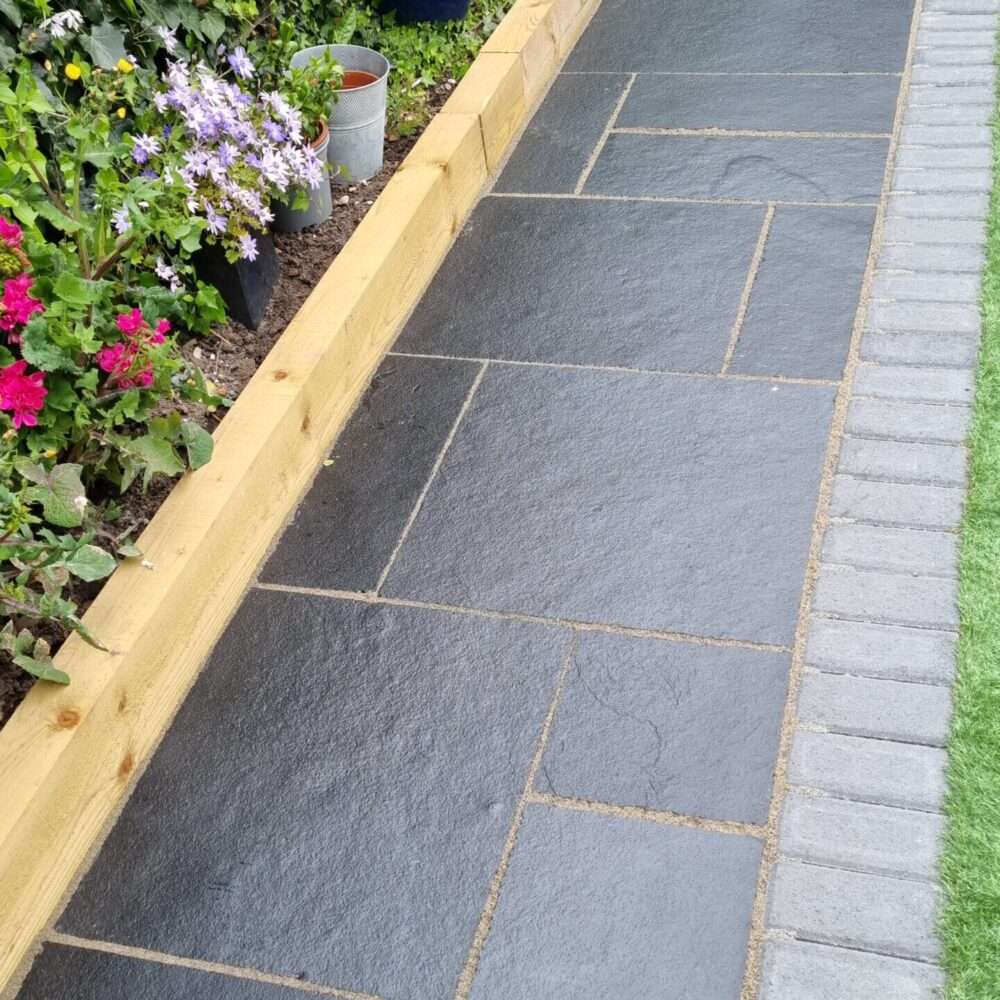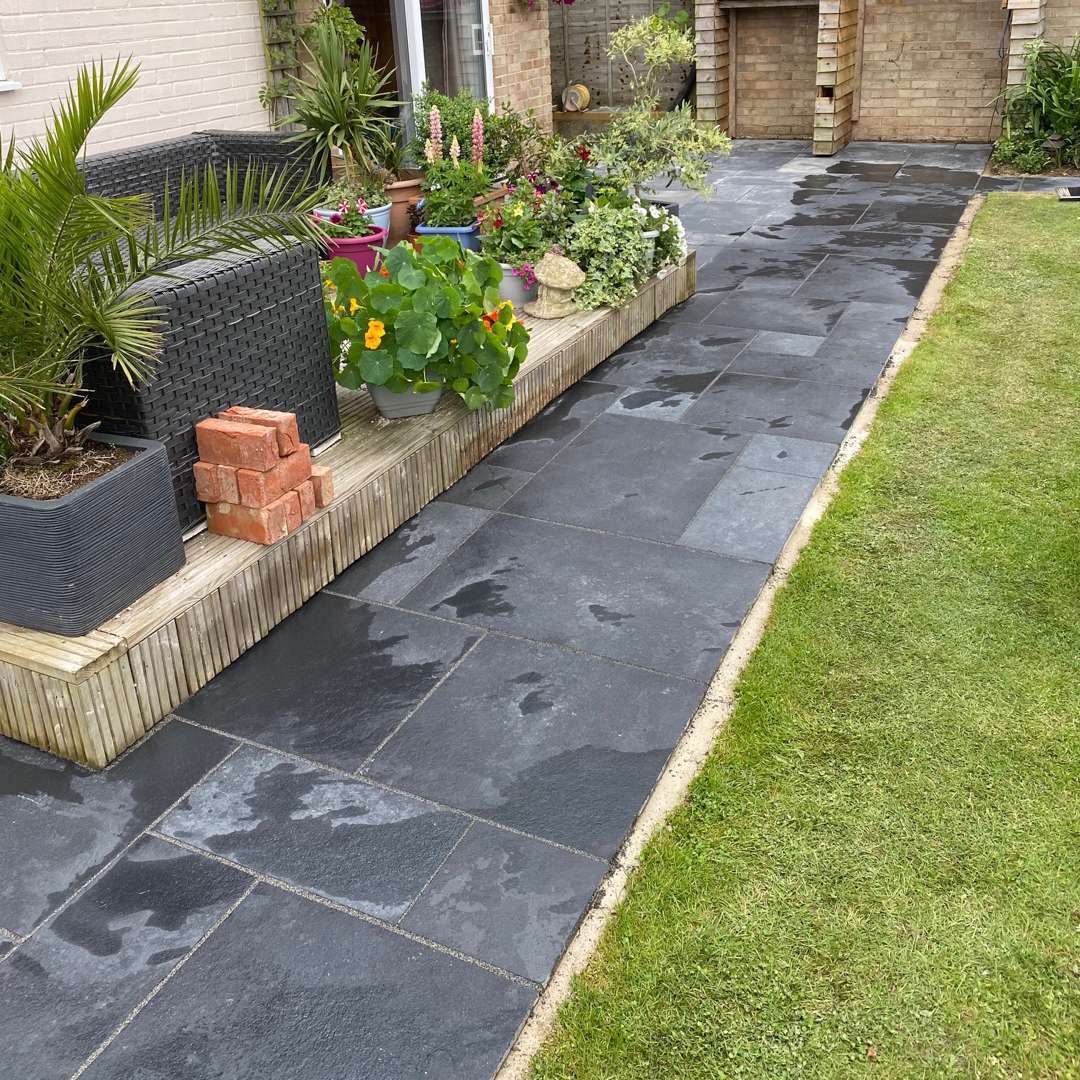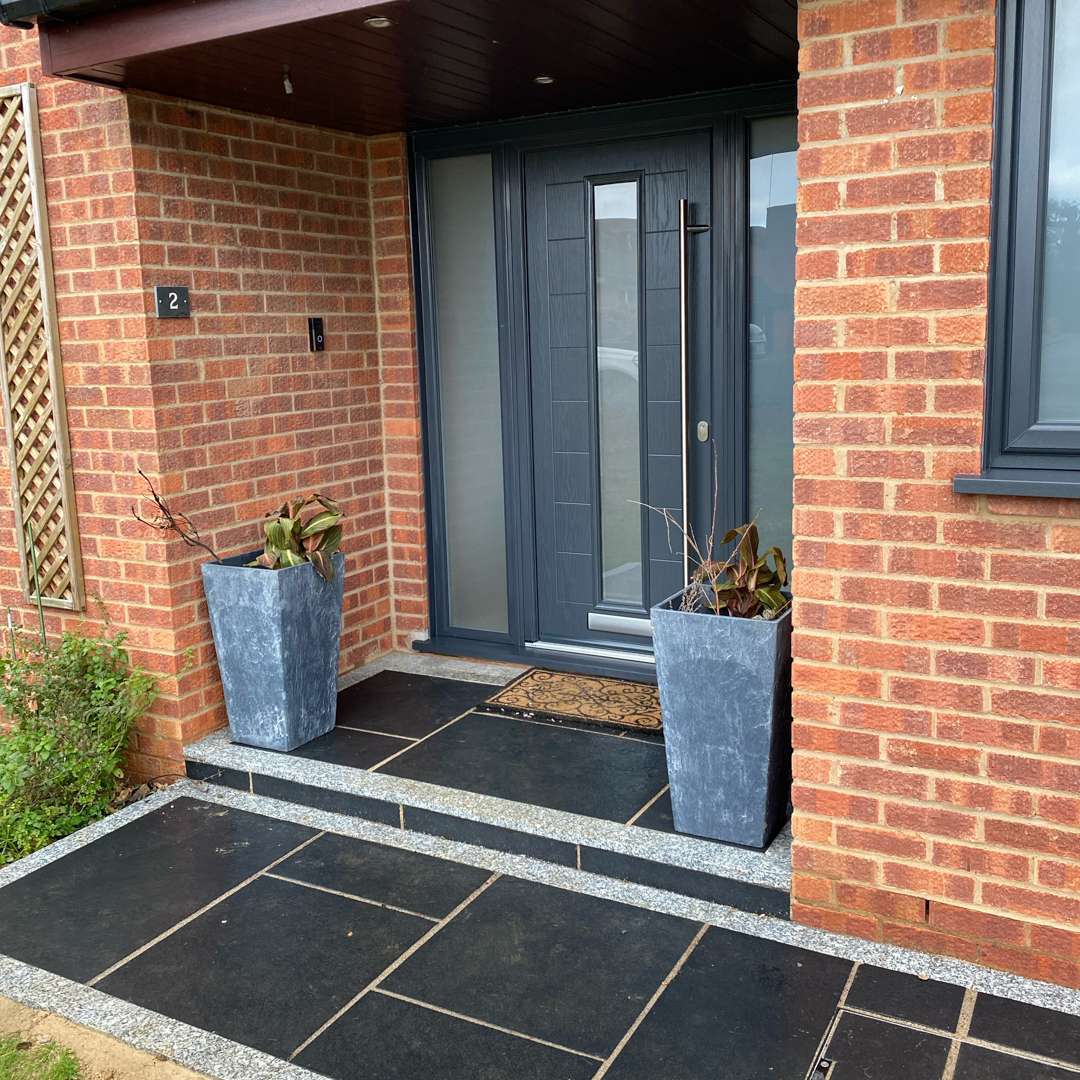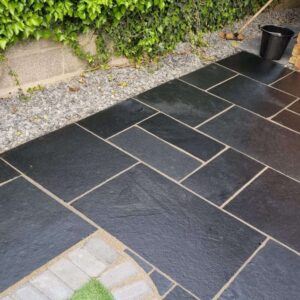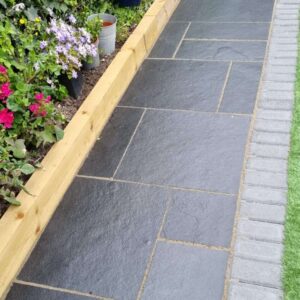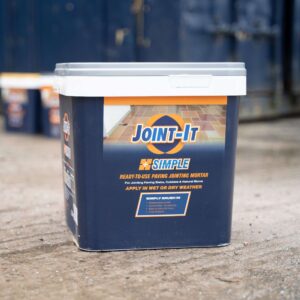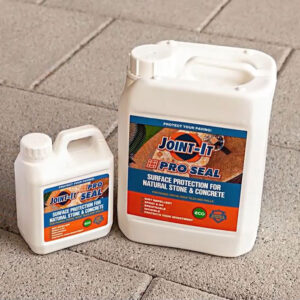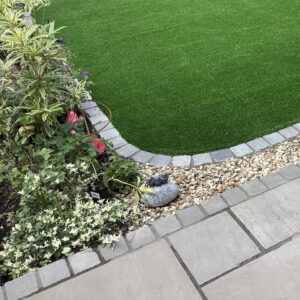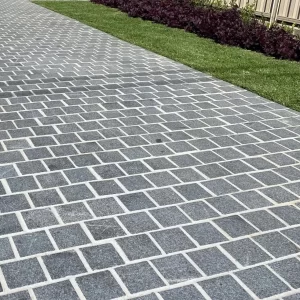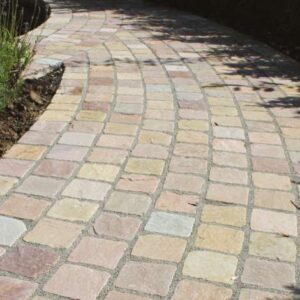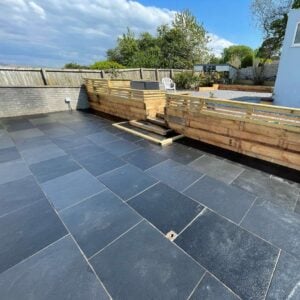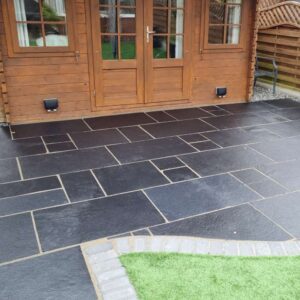Kotah Black Sawn Edge Indian Limestone Paving Slabs – Patio Pack – 22mm Calibrated
£199.00 – £395.00 inc. VAT
- Durable & Hard-Wearing
- Lightly Riven Surface
- Sawn Cut Edges
- Looks Great Wet & Dry
- Low Maintenance
- Natural Slip Resistance
Pack Coverage:

FREE Delivery UK-wide*
Free shipping on all orders

Kerbside Pallet Delivery
Delivered via Palletways
Trade & Bulk Discounts
Up to £40 off per pack on all paving

Price Match Guarantee
We will not be beaten on price
Kotah black Indian limestone paving slabs are a stunning natural stone that offers bold, dark colours to give a contemporary and striking effect to any garden or patio space. Kotah black limestone paving slabs (Kotah black) are the most popular patio slabs that feature a dark blend of natural greys & blacks with a hint of dark blue, and they will dramatically change your space with a modern and eye-catching finish.
Black limestone paving is unlike anything you will have seen before – the bold, dark black colour that will offer you dramatic shades combined with excellent strength and durability. Many people find it hard to believe that this shade is natural – the surface is smooth, the colour is consistent with little variation and black limestone slabs can be cut very easily to fit any space that you want. It is easy to see why Kotah black Indian limestone slabs are one of the most popular patio options.
Product Info
| Brand | Ammaari Stones © |
| Product | Paving Slabs |
| Material | Limestone (Natural) |
| Thickness | 22mm Calibrated |
| Surface | Lightly Riven |
| Edges | Sawn |
| Colour | Kotah Black |
| Origin | India |
| Suitable For | Patios, Paths, Steps |
| Sealing | Recommended – Improves maintenance |
| Weathering | Colour will fade over time |
| Frost Resistance | Yes |
| Slip Resistance | Yes |
Pack Sizes
| Slab Size | 4m² | 8m² | 17m² | 19.5m² |
| 900x600mm | 3 slabs | 7 slabs | 15 slabs | 16 slabs |
| 600x600mm | 3 slabs | 6 slabs | 13 slabs | 16 slabs |
| 600x290mm | 3 slabs | 7 slabs | 14 slabs | 16 slabs |
| 290x290mm | 2 slabs | 5 slabs | 10 slabs | 12 slabs |
Care Instructions
We recommend brushing away any debris from your paving slabs on a regular basis and washing the surface of the slabs when required. It is advised to seal limestone paving on a regular basis to help provide your paving slabs with additional protection against the British weather.
We advise you to use warm soapy water and a stiff brush to scrub the surface of the paving. Do not use any acidic or acidic-based products when cleaning your limestone paving slabs.
We're here to help
Frequently bought together...
Ratings & Reviews
Verified by REVIEWS.io ©
Product Information
Kotah black Indian limestone paving slabs are a stunning natural stone that offers bold, dark colours to give a contemporary and striking effect to any garden or patio space. Kotah black limestone paving slabs (Kotah black) are the most popular patio slabs that feature a dark blend of natural greys & blacks with a hint of dark blue, and they will dramatically change your space with a modern and eye-catching finish.
Black limestone paving is unlike anything you will have seen before – the bold, dark black colour that will offer you dramatic shades combined with excellent strength and durability. Many people find it hard to believe that this shade is natural – the surface is smooth, the colour is consistent with little variation and black limestone slabs can be cut very easily to fit any space that you want. It is easy to see why Kotah black Indian limestone slabs are one of the most popular patio options.
Product Info
| Brand | Ammaari Stones © |
| Product | Paving Slabs |
| Material | Limestone (Natural) |
| Thickness | 22mm Calibrated |
| Surface | Lightly Riven |
| Edges | Sawn |
| Colour | Kotah Black |
| Origin | India |
| Suitable For | Patios, Paths, Steps |
| Sealing | Recommended – Improves maintenance |
| Weathering | Colour will fade over time |
| Frost Resistance | Yes |
| Slip Resistance | Yes |
Pack Sizes
| Slab Size | 4m² | 8m² | 17m² | 19.5m² |
| 900x600mm | 3 slabs | 7 slabs | 15 slabs | 16 slabs |
| 600x600mm | 3 slabs | 6 slabs | 13 slabs | 16 slabs |
| 600x290mm | 3 slabs | 7 slabs | 14 slabs | 16 slabs |
| 290x290mm | 2 slabs | 5 slabs | 10 slabs | 12 slabs |
Care Instructions
We recommend brushing away any debris from your paving slabs on a regular basis and washing the surface of the slabs when required. It is advised to seal limestone paving on a regular basis to help provide your paving slabs with additional protection against the British weather.
We advise you to use warm soapy water and a stiff brush to scrub the surface of the paving. Do not use any acidic or acidic-based products when cleaning your limestone paving slabs.
Kotah black Limestone paving specifications and features
Kotah black limestone comes from the Kota region of India, hence the name. This limestone is a harder material that doesn’t flake like other limestones – it is an extremely hard stone and can be much more resistant to fading than others. The deep black colour comes from the naturally occurring geographical phenomenon, and there is nothing else like it in a natural stone patio.
Kotah black Indian limestone paving slabs are an elegant natural stone consisting of black and charcoal grey colours with subtle blue undertones. Black limestone paving is ideal for both indoor and outdoor use, as either a decorative focal point or a stunning and dramatic backdrop. You can use Kotah black slabs for patio paving, driveways, pathways, or garden paving to achieve the look of your dreams.
As well as offering a unique and unusual ambience to the landscape, Kotah black limestone paving slabs offer a wide range of benefits, which include:
- Suitable for all weather conditions – perfect for a British back garden!
- Little to no maintenance required
- Excellent load bearing properties means the slabs are solid and durable
- The natural stone provides a smooth surface whilst still being slip resistant
Whether you are looking for dramatic back limestone paving or a unique Kotah blue limestone patio, we have a wide range of colours, styles, and tones for you to choose from. We have prices to suit every budget, and we can help you to achieve the garden of your dreams!
Natural variation information
Due to the dramatic natural colouring of Kotah black limestone paving, it is important to note that the colour will fade significantly over time. Both the sun and the rain can speed up the ageing process considerably, but if you understand what you will be left with you will know if this is the right choice for you. A dark black limestone patio can end up being a dark grey and some people think this adds to the charming and rustic ambience. If you choose Kotah black paving slabs, these are considerably higher quality than other black Indian stone and you shouldn’t expect too much fading over time.
Installation and aftercare
To install your black Indian stone, you will need to use a full bed of semi-wet mix of ratio 5:1 sharp sand to cement. You will need to ensure that the groundwork is prepared correctly and the base is approximately 1520mm deep. Your base should be even and solid and may require an additional level of sand or fine gravel to help your paving stones bond securely. The paving stones will need to be primed before they are laid with a priming slurry to further help the adhesion.
Your limestone patio should be swept regularly and cleaned once or twice a year to keep it looking fantastic and to protect the surface of the stone. Be careful if you use a pressure washer, as this could affect the surface of the slabs. We recommend that you use warm soapy water (using a PH neutral detergent) and a soft bristled brush to clean your natural stone paving. Never use acid-based cleaning products as this can stain and affect the colour of your natural stone.
Frequently Asked Questions
Is Kotah black limestone good for outdoor paving?
Kotah black limestone is a perfect option for outdoor paving as it is smooth and flat, providing the ideal coverage for large areas. It is also extremely hard wearing and durable, only absorbing a minimal amount of water so you can use it anywhere – patios, pool areas, courtyards, and driveways.
How long will Kotah black limestone last?
Once your limestone paving has been installed, you can expect it to last for decades with the proper maintenance and cleaning. Limestone is renowned for being hard wearing, durable and extremely strong with minimum water absorption so you don’t have to worry about moss and algae ruining your outdoor space.
How much does Kotah black limestone cost?
Kotah black limestone is available in various sizes to suit all your outdoor project needs. The cost will depend on the size of the area you wish to pave to the size of the flags you wish to use to achieve your desired look. On average, you can expect black limestone to cost £28.00 per metre square.
What exactly is Kotah black limestone?
Kotah black limestone comes from the Kota region of India, and when freshly quarried it is a deep, dark grey colour unlike any other natural paving tiles available. The finish of black limestone cannot be recreated, and gives a slightly uneven, rustic surface that occurs naturally as the layers of limestone are quarried.
Does black limestone fade?
Yes, you can expect your black limestone to fade over time. The pigment in the stone is susceptible to ultraviolet light and will fade with prolonged exposure to the sun. This will create a soft grey colour over years of exposure, but you can protect your stone from the UV light by using a UV sealant and re-applying regularly.
Does black limestone need to be sealed?
Sealing your limestone is essential to ensuring that your patio or driveway stays in its best condition. Outdoor limestone will require little maintenance if it has been properly sealed, and you will need a deep penetrating sealant to give the best possible protection. Simply brush a few layers of the sealant onto your limestone paving slabs before laying and allow the sealant to soak in and dry before you start.
Can you power wash limestone tiles?
The best way to wash your limestone tiles is to use a PH natural detergent mixed with soapy water using a soft bristled brush to get rid of any stubborn debris or stains. Power washing is not recommended to use when cleaning limestone tiles as you can very easily apply too much pressure and blast away the surface of your natural stone, leaving it open to erosion.
Does black limestone paving stain?
Frequent cleaning should prevent your limestone paving from staining, but there will be instances where embedded debris can cause small stains. You can deal with these stains by cleaning your limestone paving with warm water and a PH neutral diluted detergent and a soft bristled brush. Do not use acid-based cleaners to clean your limestone as this will affect the colour and texture of the natural stone.
How do you get oil stains out of black limestone?
If you do find that your limestone has stained, then stay away from the bleach or any harsh cleaning products. Instead, start by using a damp cloth or a soft bristles brush and warm water and see if the stain can be removed. If you find that this still isn’t working, you can try a specialist limestone stain removal cleaner.
Which is better: limestone or sandstone?
Limestone is quick to install and easy to care for and can be used for both interior and exterior flooring. Sandstone is generally softer than limestone, so it can be prone to scratching – however it offers a more rustic and charming quality that comes over time as the slabs begin to age.
Is limestone slippery when wet?
Much like any other stone surface, limestone can be slippery when wet. However, the slabs do have a naturally textured surface with small dents in that can provide grip when needed. You will need to take care as the stones become weathered with foot traffic, as this can also increase the slippiness of the stones.
How can you tell if a stone is limestone?
Limestone tends to be smooth and flat, with not a lot of ridges in the finish – meaning they are the perfect paving stones for patios and driveways. Limestones natural characteristics include an orange-peel texture, and you will often find them to be brown, grey, or black.
Is limestone good for a driveway?
Limestone tends to be flat and smooth, with less ridges in its finish (it is well known for being a smooth natural stone.) This means that the even surface makes it the ideal choice for driveways, and it is extremely strong so will be able to bear the weight of cars and heavy footfall without cracking or crumbling.
How can we protect Kotah black limestone?
It is generally advised to seal your limestone before laying it, and to re-apply the sealant regularly over the years. This will prevent any staining, weathering, and prevent the growth of moss and algae. If you choose a UV sealant, this will also help to slow down the fading and the ageing process that comes with exposure to the sun.


